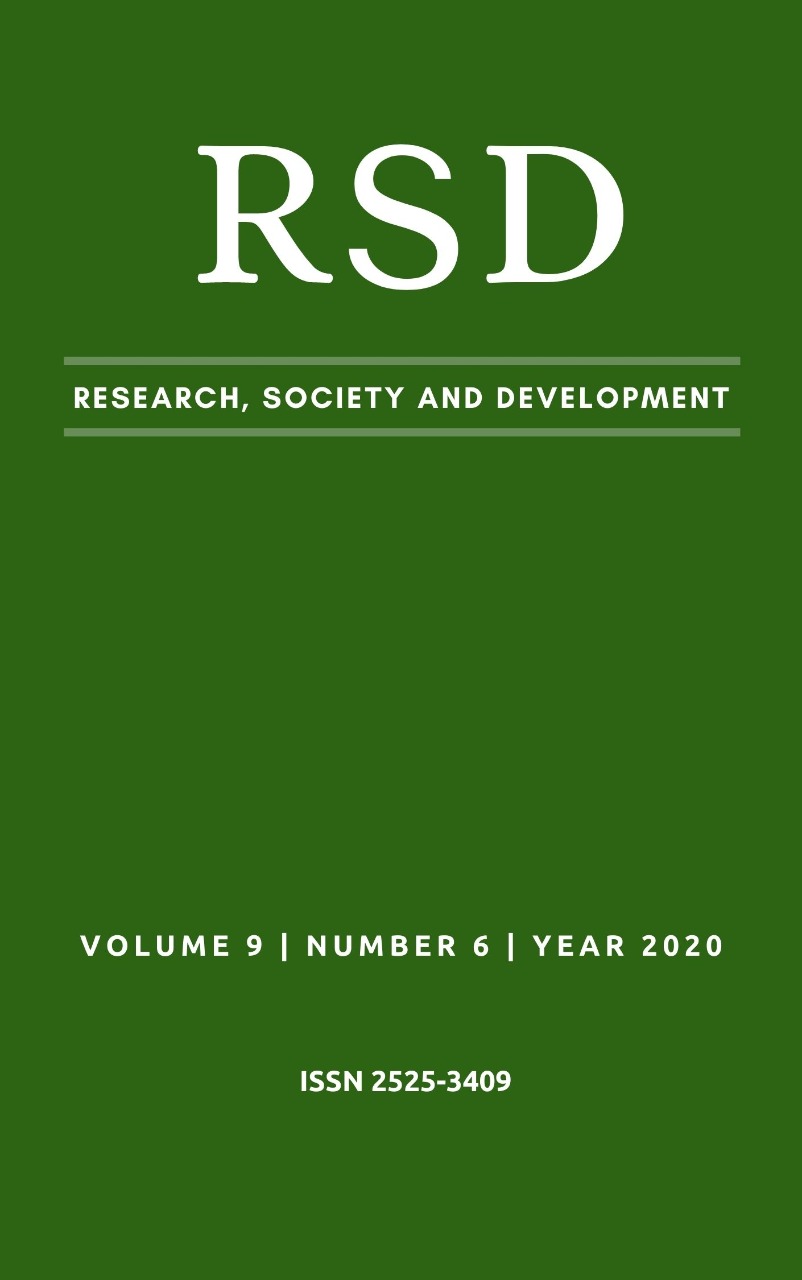Vivências e possibilidades em um estágio curricular em saúde coletiva na nutrição
DOI:
https://doi.org/10.33448/rsd-v9i6.3576Palavras-chave:
Estudantes de Ciências da Saúde, Educação alimentar e nutricional, Nutrição em Saúde Pública.Resumo
O presente esteve teve como objetivo socializar a experiência acadêmica quanto à diversidade de olhares acerca do estágio curricular em nutrição em saúde coletiva. Trata-se de um relato da vivência discente no estágio curricular em saúde coletiva no curso de graduação em nutrição em um Centro Municipal de Saúde, situado na zona Oeste do Estado do Rio de Janeiro no período de março a julho de 2018. A experiência vivenciada no estágio curricular em saúde coletiva oportunizou o discente, a olhar com diferentes lentes a atuação do nutricionista no âmbito da saúde coletiva, apreendendo que, as atribuições deste profissional transcendem a mera prescrição dietética, possibilitando e efetivando as competências necessárias para que o futuro egresso possa atuar de maneira crítica e reflexiva em sua prática profissional diária. A vivência neste campo de estágio curricular em saúde coletiva possibilitou o desenvolvimento de um olhar crítico e reflexivo acerca das contribuições do profissional nutricionista em um Centro Municipal de Saúde, analisando que este profissional como qualquer outro da equipe multidisciplinar, tem uma contribuição significativa no processo saúde-doença.
Referências
Bondia, J. L. (2002). Notas sobre a experiência e o saber de experiência. Revista Brasileira de Educação, (19), 20-28.
Brasil. (1988). Constituição Federal de 1998. Promulgada em 5 de outubro de 1988. Acesso em 10 de outubro, 2019 em: http://www.planalto.gov.br/ccivil_03/constituicao/constituicao.htm
Brasil. (2000). Ministério da Saúde. Secretaria Executiva Sistema Único de Saúde (SUS): princípios e conquistas / Ministério da Saúde, Secretaria Executiva. Brasília: Ministério da Saúde. Acesso em 04 de outubro, 2019 em: http://bvsms.saude.gov.br/bvs/publicacoes/sus_principios.pdf
Brasil. (2001). Ministério da Educação. Conselho Nacional de Educação. Resolução CNE/CES nº 5, de 07/11/2001. Diretrizes Curriculares Nacionais do Curso de Graduação em Nutrição. Brasília: Câmara de Educação Superior. Acesso em 04 de outubro, 2019 em: http://portal.mec.gov.br/cne/arquivos/pdf/CES05.pdf
Brasil. (2005). Ministério da Saúde. Projeto MultiplicaSUS: oficina de capacitação pedagógica para a formação de multiplicadores. Brasília: Ministério da Saúde. Acesso em 10 de outubro, 2019 em: https://www.nescon.medicina.ufmg.br/biblioteca/registro/Projeto_MultiplicaSUS__oficina_de_capacitacao_pedagogica_para_a_formacao_de_multiplicadores/58
Brasil. (2007). Ministério da Saúde. Presidência da República Casa Civil Subchefia para Assuntos Jurídicos. Decreto n° 6.286, de 5 de dezembro de 2007. Institui o Programa Saúde na Escola - PSE, e dá outras providências. Acesso em 10 de outubro, 2019 em: http://www.planalto.gov.br/ccivil_03/_ato2007-2010/2007/decreto/d6286.htm
Brasil. (2013). Ministério da Saúde. Secretaria de Atenção à Saúde. Departamento de Atenção Básica. Política Nacional de Alimentação e Nutrição / Ministério da Saúde, Secretaria de Atenção à Saúde. Departamento de Atenção Básica. Básica. – 1. ed., 1. reimpr. – Brasília : Ministério da Saúde.
Brasil. (2017). Lei de diretrizes e bases da educação nacional. – Brasília : Senado Federal, Coordenação de Edições Técnicas. Acesso em 10 de outubro, 2019 em: https://www2.senado.leg.br/bdsf/bitstream/handle/id/529732/lei_de_diretrizes_e_bases_1ed.pdf
Freire, P. (2011a). Pedagogia da autonomia: saberes necessários à prática educativa. 43.ed. São Paulo: Paz e Terra.
Freire, P. (2011b). Pedagogia da autonomia: saberes necessários à prática educativa. Rio de Janeiro: Paz e Terra.
Libâneo, J.C. (2011). Adeus professor, Adeus professora?: novas exigências educacionais e profissão docente. São Paulo: Cortez.
Lima, C. R., Silva, E. E., Orange, L. G., & Silva, V. L. (2017). Desafio da interdisciplinaridade na formação profissional do nutricionista; um relato de experiência. Rev. Docência Ens. Sup., Belo Horizonte. 7(2):166-181.
Medeiros, R. C.R., & Valente, G. S.C. (2010). A prática docente reflexiva baseada no currículo integrado: uma questão de competências. Revista Iberoamericana de Educación. 52 (2):1-9.
Morin, E., Ciurana, E.R., & Motta, R. D. (2003). Educar na era planetária: o pensamento complexo como método de aprendizagem no erro e na incerteza humana. São Paulo: Cortez, Brasília: UNESCO.
Pereira, A.S. et al. (2018). Metodologia da pesquisa científica. [e-book]. Santa Maria. Ed. UAB/NTE/UFSM. Disponível em: https://repositorio.ufsm.br/bitstream/handle/1/15824/Lic_Computacao_Metodologia-Pesquisa-Cientifica.pdf?sequence=1 Acesso em: 05 Abril 2020.
Perrenoud, P. (2002). A prática reflexiva no ofício de professor: profissionalização e razão pedagógica. Porto Alegre: Artmed.
Silva, J. H. S., Chiochetta, L.G., Oliveira, L. F.T., & Sousa, V.O. (2015). Implantação de uma Liga Acadêmica de Anatomia: Desafios e Conquistas. Rev. bras. educ. med. 39(2): 310-315.
Souza, C. J., et al. (2017). Experiência, alteridade e subjetividade: nexos com o ensino-aprendizagem na graduação em nutrição: relato de experiência. European Journal of Education Studies. 3(4):38.3-393.
Downloads
Publicado
Edição
Seção
Licença
Autores que publicam nesta revista concordam com os seguintes termos:
1) Autores mantém os direitos autorais e concedem à revista o direito de primeira publicação, com o trabalho simultaneamente licenciado sob a Licença Creative Commons Attribution que permite o compartilhamento do trabalho com reconhecimento da autoria e publicação inicial nesta revista.
2) Autores têm autorização para assumir contratos adicionais separadamente, para distribuição não-exclusiva da versão do trabalho publicada nesta revista (ex.: publicar em repositório institucional ou como capítulo de livro), com reconhecimento de autoria e publicação inicial nesta revista.
3) Autores têm permissão e são estimulados a publicar e distribuir seu trabalho online (ex.: em repositórios institucionais ou na sua página pessoal) a qualquer ponto antes ou durante o processo editorial, já que isso pode gerar alterações produtivas, bem como aumentar o impacto e a citação do trabalho publicado.


